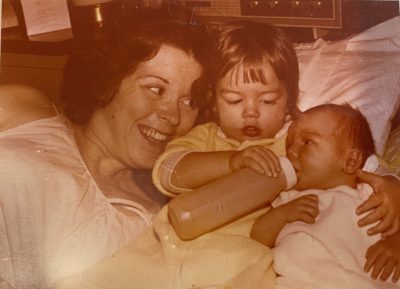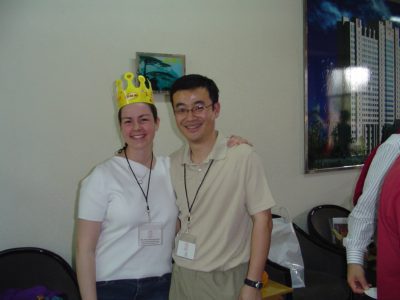Hear My Heart: A Solution

Congenital heart defects are the most common birth defects in the world and one of the most treatable. But if severe and not treated, one of the deadliest.
I should know, my brother died of a congenital heart defect in 1975.
My brother Tommy came home with us. I have photos of me propped up in bed feeding him a bottle. My family is educated. My father was in medical school when Tommy came home. Yet, it wasn’t until Tommy was hospitalized, less than 24 hours from dying, that he was screened for a heart defect.
This scenario is much less likely in the US now. Cardiac medicine has made enormous leaps since I was a child in the 1970s. When I was pregnant with my own two children, in the years 2006 and 2010, respectively, both babies had heart screenings in utero. I have a friend whose teenage son has not only survived, but thrived, with the same CHD diagnosis that my brother died of in the mid 1970s. It really is a miracle.
Unfortunately, that miracle isn’t shared everywhere. Around the world, and even in certain communities in the US, kids are not receiving the cardiac care nor the screenings that this congenital abnormality requires. It’s just too common, in my opinion, not to screen for.
In lower resourced areas, including rural China, only 20% of the kids born with a heart defect will be identified. No knowledge of their broken heart – until there is an emergency – and by that time, frankly, their heart could be in such bad shape, having worked as well as it could with its deformities, that the child is unlikely to survive surgical correction. They are too sick for surgery. The kid is sent home to die.
This is unacceptable. If only we knew earlier that there was a chance at correction. If we have the technology to correct these hearts, what needs to be done to identify these kids earlier?
This is why I’m so excited about the One Heart telemedicine solution.
It was developed by my friend Quan Ni, a brilliant biomedical scientist and engineer with several patents to his name. He has assembled this incredible team around him. People he has worked with for decades in “Medical Alley,” Minnesota’s healthcare answer to Silicon Valley, and talented friends of friends. People who, honestly, very few venture capital start-ups could afford, and they are basically volunteering their time. I’m talking NASA scientists, folks.
I watch these documentaries featuring young Ivy League graduates, sporting black turtle necks, yammering on about how they are a true innovator, their disruptive technologies, their cutting-edge medicine and then I look at my friend and One Heart Health Executive Director Quan Ni and release a contented sigh. This is a man of integrity with a real solution.
Let me tell you a bit about One Heart Health Co-Founder and Executive Director Quan Ni. Quan is a man who has dedicated his life to creating new innovations for biomedical corporations and his free time giving back in China, his country of origin.
I’ve known Quan for almost 20 years now. In a past job I would lead cardiac medical teams to countries like China, Ukraine, South Africa and Kenya with a medical NGO that would perform and teach pediatric cardiac surgeries abroad. Quan joined one of my trips to Lanzhou, China and served as a volunteer Chinese language interpreter. He took his vacation time to serve. For another ten years, or so – long after I left the NGO – he continued to serve as an interpreter in the OR, in the ICU, in the board room, soaking up all he could about cardiac medicine in China.
I trust Quan because for a decade he OBSERVED and consulted. Quan observed experienced medical professionals like One Heart Health’s eventual co-founder and medical director Dr. Lee Pyles, MD, a pediatric cardiologist who joined Quan on several medical exchanges. This level of observation both of US cardiac professionals and the realities of medicine in China, shows in One Heart Health’s final product.

Back in 2004, Quan stood by me and explained in Mandarin to the family who traveled hours to be considered for surgery that their child was too sick to operate on. The CHD had done just too much damage. In the face of that child’s mother, I saw my own my mother with her infant Tommy. Even as I write this I am overcome with emotion. Quan has seen this face too, and it has changed him. It changed us.
When Quan first told me of the portable heart screening solution that he developed with Dr. Pyles and software engineer Weiguang Shao, I thought, of course you figured it out. You figured a solution to enable earlier universal pediatric cardiac screenings. Then when he asked me to help raise money for the organization, a nonprofit, I said – yes, but why not engage venture capitalists? What other way is there to fund new research and development and enable technology transfer than investors?
Quan has been certain since day one that this is a technology that will be funded as a nonprofit, not from venture capitalists expecting a return. He has extensive professional experience with the latter and that is not the future for the One Heart app. I have to admit that my head exploded a little when told that, but then I realized how much the organization has done already with donations from foundations, research organizations and most importantly individuals. We are strong and we are poised to get stronger, because we have a solution.
I am someone who has spent the last 20 years working in and for humanitarian organizations and I cannot tell you how exciting it is to wake up every morning and know that I am part of a team with a solution. Over 24,000 kids have already been served by One Heart Health and that’s just a small percentage of those that could benefit from it.
How has my life been affected by CHD? I think of the genetic prevalence of CHD in my family. I think of my brother who passed, and my other brother with CHD who survived. I think of my father who had open-heart surgery as an adult for his CHD a few years ago. A CHD he didn’t realize he had until he did an auscultation unit in medical school. I think of his first-cousin who was one of the first open-heart surgery CHD survivors in the world in 1955 (and grew up to be a cardiologist!). I think of the kids I met in China, Kenya, South Africa and Ukraine. I think of their families. Those we were able to help and those that were too sick.
Then I think of the One Heart telemedicine solution. That is why I work for One Heart Health. I volunteer my time for One Heart Health and I donate to One Heart Health. It feels good to be part of a solution. I hope you think so too.
This story was written by Karen Baumgaertner. Baumgaertner is Director of Development at One Heart Health. She is a former program specialist at Children’s HeartLink and the co-founder of the Minnesota International NGO Network, the state’s largest convener for international humanitarian practitioners.
Hear My Heart is an effort to hear the stories of those individuals and families affected by congenital heart defects (CHDs) and the value of cardiac screenings. One Heart Health believes that every child with heart disease should get a chance at a healthy life. Yet around the world 90% of kids with CHDs do not receive the treatment they need, often because they are never screened.
One Heart Health’s innovative phone app, when coupled with a digital stethoscope, is a portable and inexpensive way to enable heart screenings for kids in remote or under-resourced areas. Over 24,000 children have already received heart screenings as a result of One Heart Health, resulting in lives saved. Donations like Karen’s go to ensure more kids receive life-saving screenings.
Please consider a donation to One Heart Health to expand its services to more kids around the world. Donate today.
If you would like to share your family’s CHD story and why heart screenings are important to you, write us at give@onehearthealth.org.



